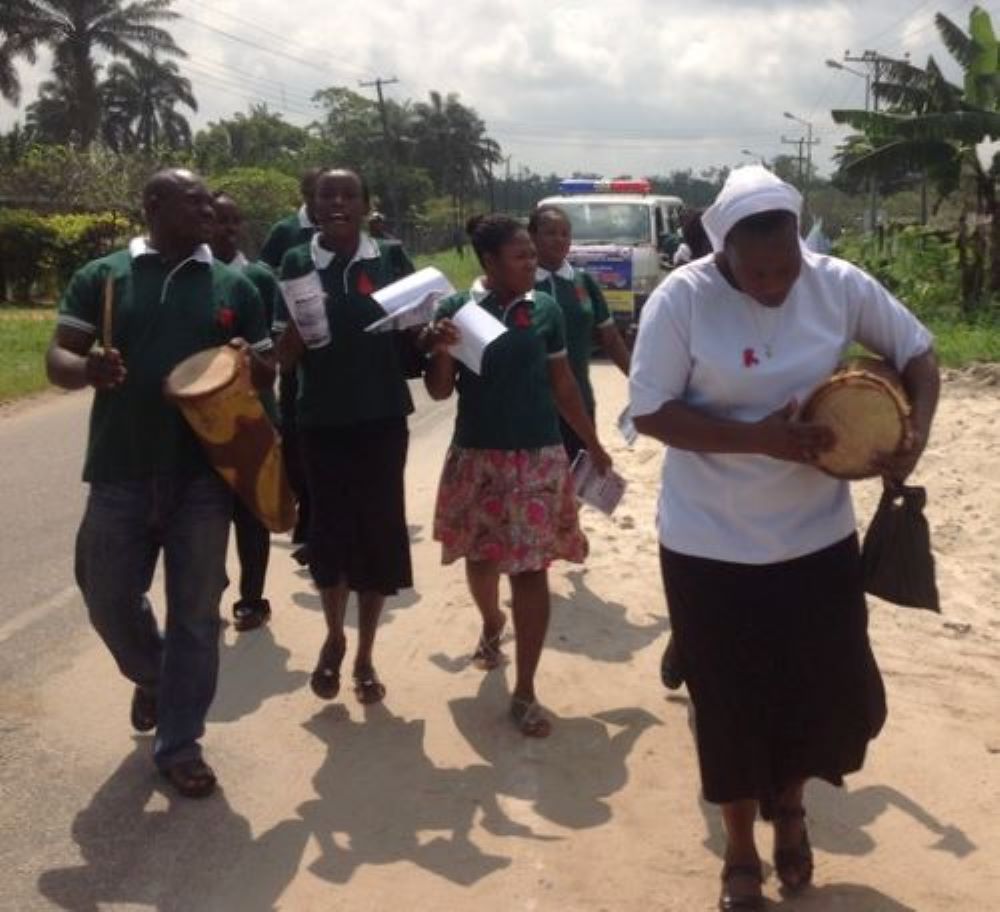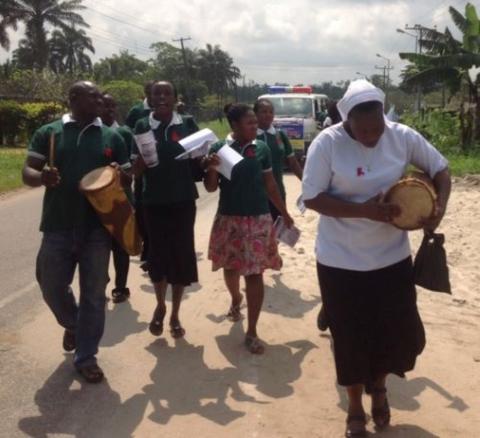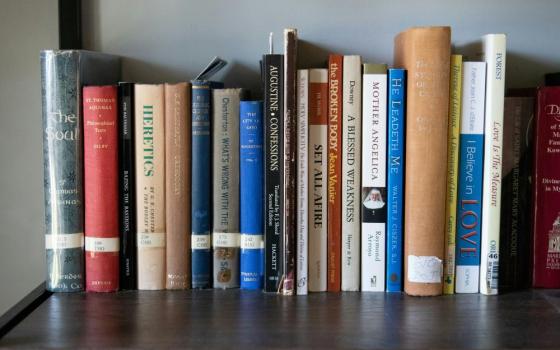
Sr. Freda Ehimuan (with drum) leads a prayer procession for World AIDS day in Kirikiri town, Lagos, Nigeria. (Courtesy of Freda Ehimuan)

Sr. Freda Ehimuan (with drum) leads a prayer procession for World AIDS day in Kirikiri town, Lagos, Nigeria. (Courtesy of Freda Ehimuan)
The African traditional society is not homogenous in nature. It is diverse and heterogenous. It is a known fact that every person who grows up in a particular society is infused with the culture of that society — knowingly or unknowingly.
Although Christianity is not a culture but a faith experience, it can be expressed by cultural means and ritual. For the African it is impossible to dissociate Christian practices from their cultural background. That was the mistake of missionaries who came to evangelize Africa. Making Christianity a religion that dissociated itself from the African ritual and religious instruments was a big hindrance. I heard that during their synod the African bishops said that in Africa, "Christianity is widespread but skin deep."
African cultural expression of faith is based on community harmony between the living and their ancestors. Most taboos and abominations are community based — therefore connected with religion — and have grave consequences. With the advent of Christianity, the fear of these repercussions was undermined by the early Christians who were convinced that the Christian God — the God of light — is more powerful than the African gods of the darkness. Therefore, there was no reason to fear repercussion when they violated any taboos.
Some Africans, who were finally convinced that the African god is powerless and the Christian God is a God of love and does not harm anybody, became nonchalant in their morality because they lost the fear of repercussions.
Advertisement
Meanwhile, Christians were trying to convince themselves that the African gods are powerless. They saw some crumble under the effects of committing abominations like burning shrines or killing sacred animals that they are forbidden to kill. As a result, Christians became afraid of these African gods and their ability to punish.
While they practiced Christianity in the cities and towns, they secretly paid the elders to help them offer the necessary sacrifices in the villages to appease the gods. In this way, Christianity began to lose hold over the Africans, who feared their gods more than the Christian God. At this point, the Pentecostal churches became influential in Africa partly because they used African religious instruments that invoked the presence of God for the African people. They also Christianize African rituals that feed the faith of the African people. In these churches, the Africans can feel a connection with the Divine. The Africans are moved to a contemplative stance where they experience a divine reality that overwhelms and frees them, at least temporarily.
Some cultural expressions of faith that illustrate these points include:
- Worship: For the African, worship is the expression of feelings (negative and positive) toward the Divine, in different ways and through various media. Since worship is the expression of feelings, songs, dance, drums and incantations are significant to African worship. Physical expression is important in African worship; even if the person remains motionless, they may be crying, or making sounds from their throat. Without these expressions, Africans think that their worship is not deep enough and that it lacks the ability to reach God. They go through the rubrics of worship without experiencing an internal impact.
- Customs and rites: Since each African region has its own community-based expressions, every aspect of life is ritualized and celebrated. When a woman gets pregnant, the community offers prayers in a ceremonial form. When the child is born there is a ritual to welcome the child into the community. Then there is a ritual to name the child, one to initiate the child into adolescence, one for marriage and other initiation ceremonies for adulthood and old age. The final ritual is the burial rite, to join the person with the ancestors who have the duties of watching over the living community.
- Instruments: Another cultural way of expressing faith in Africa is the use of drums for worship. These drums are played by specific people to call down blessings on the community. There are flutes, gongs and other instruments that are used to worship and bring down a blessing upon the people. Some African communities also use incense to ward off evil spirits and witches.
Some practical examples of African expressions of faith are:
- A bishop has been speaking against dancing in the church for many years. One day he got a donation from some organization to build a pastoral center. He was so full of joy that right there on the altar he began to sing and dance. All the parishioners were so surprised that they spontaneously danced with him. Of course, he stopped when he realized what he was doing! When some Africans — who feel that they are civilized and too dignified to dance in worship — are shaken by incidents or experiences, their true nature comes out. Physical expression is their natural way of expressing faith whether they deny it or not.
- A woman went to the parish office to have her rosary blessed by the priest. After the blessing, the woman came to my office and asked me to bless her rosary. Not knowing that she had seen the priest, I did my usual ritual of raising the rosary, placing my hand over it, sprinkling holy water on it, then praying out loud so she could hear. As I was finishing, the priest walked past and said in surprise, "Have I not just blessed your rosary?" The woman answered, "Yes, Father, but this is prayer and I need it." For her, Father's quick flash of hand is not a prayer at all. We went on to "educate" the woman, but I don't think anything we said meant much to her.
- Human traffickers use the fear of the deity to keep trafficked victims under control. They go before a traditional African shrine to swear that death should fall upon them if they break the contract with their traffickers. This same fear does not allow the victims to see that if the trafficker breaks the contract, nothing happens to them.
- I created a ritual to undo any curse on the victims of human trafficking. Understanding that African expression of faith moves from the physical to the spiritual, I created a ritual that "reversed" the results of the curse, using a Christian item like the crucifix, incense, rosary, holy water or clay to replace a pagan symbol. Many girls came to me believing that this ritual saved their lives. Perhaps the powerful physical symbols triggered their spiritual powers and helped them to break free from fear of their traffickers. The spiritual power of the African is set free by a strong physical expression of faith.
It has been interesting for me to note the similarities between the African religion and Christianity, with regard to rituals. When these similarities are employed well, African Christians can become more authentically themselves — and more truly Christian.








